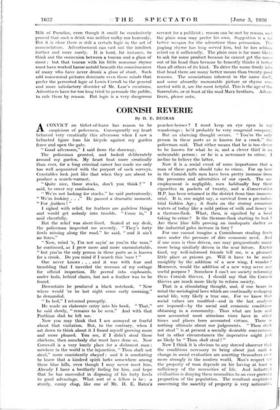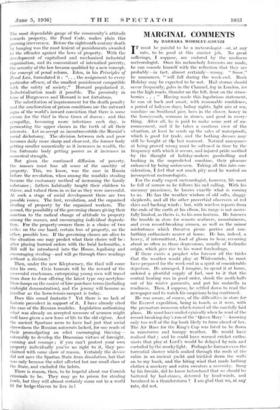CORNISH REVERIE
By H. E.
DEGRAS
ACONVICT on ticket-of-leave has reason to be suspicious of policemen. Consequently my heart behaved very erratically this afternoon when I saw a helmeted figure lean his bicycle against my garden fence and open the gate.
"Good afternoon," I said from the doorway.
The policeman grunted, and looked deliberately around my garden. My heart beat more erratically than ever, for a long criminal career has made me only too well acquainted with the purport of such surveys. Constables look just like that when they are about to produce a search-warrant.
"Quite nice, those stocks, don't you think ? " I said, to cover my confusion.
We'm not look+ a for stocks," he said portentously. " We'm looking . . ." Ile paused a dramatic moment. "For feathers !"
I sighed with relief, for feathers are guileless things and would get nobody into trouble. "Conic in," I said cheerfully.
But the relief was short-lived. Seated at my desk, the policeman inspected me severely. " They's forty fowls missing along the road," he said, "and it ain't no foxes."
"Now, mind 'e, I'm not say-in' as you'm the man," he continued, as I grew more and more uncomfortable, "but you'm the only person in these parts as is known for a crook. Do you mind if I search this 'ouse ? "
One never knows . . . and it was with fear and trembling that I unveiled the recesses of my cottage for official inspection. Ile peered into cupboards, - under beds, behind chairs, but not a feather was -to be found.
Downstairs he produced a black notebook. "Now where would 'cc be last night conic early morning," he demanded.
"In bed," I returned promptly. , He made an elaborate entry into his book. "That," he said slowly, "remains to be seen." And with that Parthian shot he left me.
Now you may think that I am annoyed or fearful about that visitation. But, to the contrary, when sat down to think about it I 'found myself growing more and more pleased. You see, if I didn't steal those chickens, then somebody else must have dope so. Now Cornwall is a very lonely place for a dishonest man : nowhere in the world is the injunction, "Thou shalt not steal," more consistently obeyed : and it is comforting to know that a kindred spirit lurks somewhere among these blue hills, even though I may never meet him. Already I have a brotherly feeling for him, and hope that he has succeeded in disposing Of his forty fowls to good advantage. What sort of a fellow is he : :a sturdy, canny chap, like one of Mr. H. E. Bates's poacher-heroes ? I must keep an eye open in my wanderings ; he'd probably be very congenial company.
But an alarming thought occurs. " You'm the only person in these parts as is known for a . crook," the policeman said. That either means that he is too clever to be known for what he is, and a clever thief is an unbearable person : or he is a newcomer to crime. I incline to believe the latter.
Now it is a social event of some importance that a man of these parts should take to crime. For up here in the Cornish hills men have been pretty immune from the pressures and adversities of our epoch. The un- employment is negligible, men habitually buy. their cigarettes in packets of twenty, and a -Conservative M.P. has been returned in the district from, time immem- orial. It is, one might say, a survival from a pre-indus- trial Golden Age ; it floats on the stormy economic waters of today like a mild potion of milk and honey in a thermos-flask. What, then, is signified by a local taking to crime? Is the thermos-flask starting to leak ? Are these blue hills proving an inadequate shelter as the industrial gales increase in fury ?
For one cannot imagine a Cornishman stealing fowls save under the pressure of dire economic need. And if one man is thus driven, one may prognosticate many more being similarly driven in the near future. Exeter Gaol, my well-informed friends tell me„ is a pleasant little place as prisons go. Will it have to be made unsightly by the addition of a new wing, I wonder ? Moreover, would the addition of a new wing serve any useful purpose ? Somehow I can't see society reforming these Cornish thieves. I should say that the Cornish thieves are much more likely to reform society.
That is a stimulating thought, and, if one bears in mind the sociological laws which are continually reshaping social life, very likely a true one. For we know that social values are modified—and in the last analysis are imposed—by the social and economic conditions obtaining in a community. Thus what are here and now accounted most atrocious vices have in other times and places been accounted virtues. There is nothing 'ultimate about our judgements. "Thou .shalt not steal" is. at present a socially desirable convention: but in -other circumstances the imperative might just as likely be "Thou qiudt steal !
Now I, think it is obvious to any shrewd observer that the conditions, necessary to bring about ,just such a change in social evaluation are asserting themselves ever more strongly in the modern world. Man's respect for the 'property of man depends on his having at least a sufficiency of the necessities.. of. life. And industrial civilisation is denying these necessities to an.ever-gro. win! proportion of the population. The resultant seepticisei concerning the sanctity of property is very, noticeable. The most dependable gauge of the community's attitude towards property, the Penal Code, makes plain this growing irreverence. Before the eighteenth century death bv hanging was the most lenient of punishments awarded to the offender against the laws of property. With the development of capitalised and mechanised industrial organisation, and its concomitant of intensified poverty, the severity of the law became qualified by a new concept, the concept of penal reform. Eden, in his Principles of Penal Law, formulated it : ". . . the assignment to every particular offence, of the smallest punishment compatible with the safety of society." Howard popularised it. Industrialisation made it possible. The proximity in time of Hargreaves and Howard is not fortuitous.
The substitution of imprisonment for the death penalty and the amelioration of prison conditions arc the outward signs of the world's inward conviction that there is some excuse for the thief in these times of duress : and this sympathy, becoming more infectious each day, is permeating the upper classes in the teeth of all their interests. Let us accept as incontrovertible the Marxist's social dichotomy. The 'division between rich and poor becomes daily more sharp and clear-cut, the former body getting smaller numerically as it increases in wealth, the less fortunate body getting poorer as it increases in numerical strength: But given , the continued diffusion of poverty, the masses must lose all sense of the sanctity of property. This, we know, was the case in Russia before the revolution, when among the muzhiks stealing became the customary method of increasing the family substance ; fathers habitually taught their children to thieve, and valued them in so far as they were successful. At such a stage of social development there are two possible issues. The first, revolution, and the organised stealing of property by the organised workers. The second, the possibility of the governing classes giving their sanction to the radical change of attitude to property among the masses, and encouraging individual depreda- tion. For the property-owners there is a choice of two evils : on the one hand, certain loss of property, on the other, possible loss. If the governing classes are alive to the situation one may predict what their choice will be : after placing hurried orders with the loCal locksmiths, a Bill will be introduced into the House, legalising and encouraging stealing—and will go through three readings without a division !
Then, under the new Kleptocracy, the thief will come into his own. Civic honours will be the reward of the successful cracksman, enterprising young men will travel from door to door offering the latest type oxy-acetylene blow-lamps on the easiest of hire-purchase terms (including midnight demonstration), and the jemmy will become as familiar as the lawn-tennis-racquet is today.
Does this sound fantastic ? Yet there is no lack of historic precedent in support of it. I have already cited the case of the Russian muzhiks. Legislation authorising what was already an accepted measure of acumen might well have given a new lease of life to the old regime. And the ancient Spartans seem to have had just that social shrewdness the Russian autocrats lacked, for one reads of their promulgating an edict encouraging thieving— ostensibly to develop the Draconian virtues of foresight, cunning and courage ; if you can't protect your own Property individually you've no right to it, they pro- claimed with some show of reason. Certainly the device did not save the Spartan State from dissolution, but that was only because the edict affected but one small class of the State, and excluded the helots.
There is reason, -then, to be hopeful about our Cornish criminals to be. They may go to prison for stealing fowls, but they will almost certainly come out to a world fit for hedge-thieves to live in















































 Previous page
Previous page